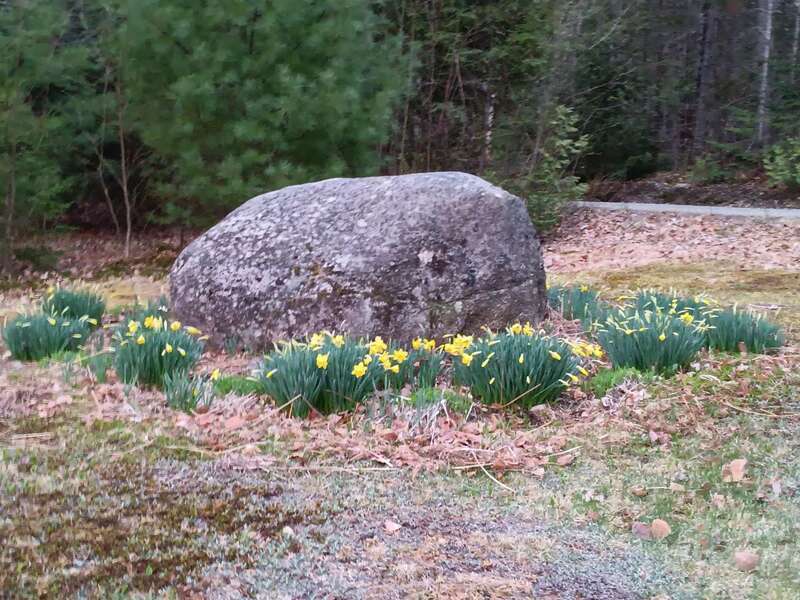Daffodils, Equity, and Forsythia Sage
Jon Reisman
Forty Mays ago, my late wife Ernie and I moved into a largely unfinished house on Cathance Lake in Cooper. May is lovely — cool, bugless mornings, full of sunrise concerts from songbirds, ravens, and woodpeckers, with loon warbles and serenades in the evening.
The black flies can get serious later in the day, especially as June approaches, so you want to get your gardening and outside work done early. In 1985, one of my first tasks was setting a TV antenna up on the roof. I was successful in securing grainy reception out of Bangor and Canada, but I made a major donation to the Black Fly Blood Bank in the process.
Ernie loved flowers, and we planted a lot of daffodils and tulip bulbs. The deer ate the tulips, but the daffodils have multiplied.
This spring, the yellow colors we planted years ago are haunting me with their beauty and attached memories. It doesn’t seem fair.
Forty years ago, “fairness” was what “equity” meant. Fairness could be hard to define, but there was some effort to consider and measure it, with concepts like horizontal (treat people in the same situation the same) and vertical (treat people in different situations differently) equity. “Fairness” remained a subjective concept — there might be agreement that something was unfair, but little consensus on what might be fair. “Fairness” then and “Equity” today are apparently like Justice Stewart’s observation about obscenity — we can’t define it, but we know it when we see it.
Unfortunately, Equity today is broadly promoted through Diversity, Equity, and Inclusion (DEI) programs, and in specific policy initiatives like Maine’s climate action plan. There is no definition of Equity in Maine State Government, despite the liberal use of your tax dollars to promote whatever equity is. Promoting an undefined policy goal is pure policy malpractice, and it is going to bite Maine in the ass — and probably the wallet too.
I am giving up some bugless early May days to travel to Augusta and testify on LD 1593, which seeks to require state agencies promoting equity to define and assess it.
Here is a portion of my testimony:
A series of FOAAs has revealed that Maine State Government has no definition of “equity,” despite broadly promoting “equity” as part of Diversity, Equity and Inclusion (DEI) policies and as part of specific policy initiatives such as the Climate Action Plan. Promoting an undefined policy goal is pure policy malpractice.
A partial list of Maine State Government entities with no definition of equity includes the Governor’s Office of Policy Innovation and the Future, the Departments of Environmental Protection, Administrative and Financial Services, Labor, Health and Human Services (DHHS), Public Utilities Commission, Public Advocate, University of Maine System (including the Law School), Secretary of State and Attorney General. DHHS cited this (non) definition from the DHHS DEI Strategic Plan: Equity – when barriers are identified and removed to ensure fair treatment, equality of opportunity, and fairness in access to information and resources for all.
Despite not having a definition of equity, the Climate Action Plan developed a number of equity metrics with the assistance of the University of Maine’s Mitchell Center for Sustainability Solutions. This is egregious and aggravated policy malpractice.
Although K-12 public education is equally guilty of such equity policy malpractice, an amendment to restrict coverage to state-level entities is a good idea to get started and avoid a mandate flag.
President Trump is trying to nuke DEI. LD 1593 is a proposal to bring transparency and sunlight to equity policy, as opposed to a gag. Requiring a definition of equity and associated metrics is the minimum action this legislature should take to protect the State from the arbitrary and capricious liabilities our equity policies have created.
LD 1593 is something like the flower bulbs Ern and I planted so many years ago. Some will get eaten by voracious Democrats. Others will proliferate and bring some beauty to the policy landscape.
Jon Reisman is an economist and policy analyst who retired from the University of Maine at Machias after 38 years. He resides on Cathance Lake in Cooper, where he is a Selectman and a Statler and Waldorf intern. Mr. Reisman’s views are his own, and he welcomes comments as letters to the editor here or to him directly via email at [email protected].





